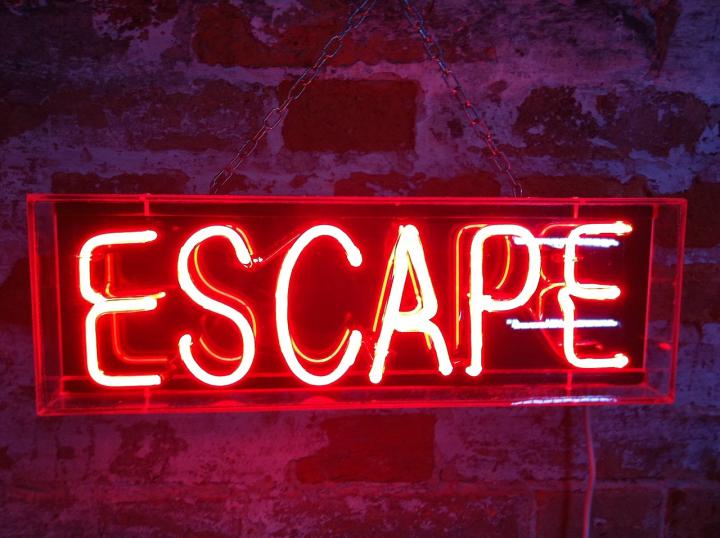The Escape Artist: Avoidance and Other Disappearing Acts
MindLetter post written by Dr Kitty Wheater.
Dear all,
As we all gear up for the start of term, this week, we take a look at a particular reaction of the mind under stress...

The Escape Artist: Avoidance and Other Disappearing Acts
You have a meeting first thing, and you’re thinking about the email that came in at 6am. ‘Ready for school?’ you say to your child in the kitchen. The child is quiet, and looks withdrawn, as they have done for some time. You have to get to your meeting, so you head to your study.
Your dissertation is due in a month. You are not sure what you are writing, and you are worried. You’re reading and making notes, but it doesn’t seem to be going anywhere. Hours go by. You have not achieved enough to earn a weekend off, so you try to work, but you seem just to wind up on Instagram. You are tired, and scared about the deadline.
You have been living on your own during lockdown. It’s tough, and you have been drinking more than usual to wind down after work. You feel groggy in the mornings, and so you stop going for your run before work. This means you don’t sleep well, so you have an extra glass after dinner, too, to help you drift off. You slow down at work, and are starting to forget things.
Do any of these look familiar to you? One of these scenarios may resonate more than others, depending on whether you are a parent, a student, a runner, or all of the above; whether you live alone, or not; whether you are a morning person, or not.
1. The Stress Equation
As the camera pans over the Edinburgh skyline, the setting for our story becomes clear: it's stress. It’s seeping up through the floorboards, washing around the main characters as they head to the meeting on Teams, sit grimly at the computer on a Saturday, and turn off the alarm, groggy and headachy.
Simply put, the parent, the student, and the runner are experiencing stress because they are experiencing too much: information, emotion, time alone, unstructured time, maybe even red wine.
‘Too much’ is, on the one hand, subjective. We all know someone who can take phone calls while also brilliantly comforting their child at 6am, or spend weeks happily in their own company, or down several pints on a Friday night and come top of their age group in the Park Run the next morning. This means that we may be tempted to tell ourselves, if we are struggling, that we are ‘being weak'. When it comes to others, we may indulge in competitive stressing, to establish that we have more to be stressed about than they do.
But what ‘too much’ really means is that your personal history, multiplied by the unique set of circumstances in which you find yourself in this moment, divided by the resources you have to meet it, equals more than 1. The parent’s meeting is perhaps the culmination of a big project; his child’s unhappiness makes him uncomfortable, because he was unhappy at that age, too. The student was a star pupil at school, but she has no job lined up for when she graduates, and she is terrified of failing. The runner was doing OK despite the lockdown until her cat died, suddenly.
The balance tips. It happens to all of us. And when stresses are multiplied, as in exceptional times, we may be surprised at the strength of our own reactions. But in the simplest terms, when you are operating at more than 1, you start running on an energetic and emotional deficit. What happens next?
2. The Escape Artist
The main character of our story is not the parent, the student, or the runner. The main character is the mind.
The mind under stress typically responds in one of two ways. It may jump in and try to solve the problem: fixating, ruminating. The parent, up too early reading emails, is doing this. But then something else happens – the child is unhappy – and rather than jumping in, the mind withdraws. The parent literally leaves the room.
Later, he may berate himself for not lingering a little longer; he may even internally accuse himself of being a ‘bad parent’. But this is the same mind that learned, on a visceral level over many millennia, to bolt at the hint of a large be-furred face in the grassland. The mind looks to escape under stress for very good reason: there are times when running, jumping, or flinching can save our life. Lions aside, avoidance of what’s difficult makes an awful lot of sense. And usually, it’s fine to wait until the meeting has passed to check in with the child; it’s sensible to question whether your thesis is going in the right direction; a glass of good wine is a pleasure in a quiet evening.
The problem arises when we get really good at it: when the deficit accumulates over time, as with chronic stress, or happens all at once, as with trauma. When this happens, the mind turns escape into an art form, and the mind will react to emotional threats as if they are lions. Fear that our child is unhappy, fear of the future, or frustration with a lonely lockdown, morph into a be-furred face. And so we may leave the room either literally, or metaphorically. The student hides from her thesis; the runner disappears into Scotch.
What happens next?
3. Escalation
Here’s the thrust of the plot: if the mind chronically escapes, things may get worse before they get better. A child’s silence stretches into months, and the parent retreats into work. The dissertation is fumbled together in a sleepless last week, and the student’s self-criticism is entrenched. Perhaps the runner, who no longer runs, slides into depression.
Things get worse because escaping, well-intentioned as the fight/flight system is, moves further away from the emotional nub of the matter. Emotions like fear, anger, and sadness are as old as the first human who ran from a lion. But for the stresses where fleeing doesn’t work – with the child, the dissertation, the loneliness – we must try something else.
What might that look like?

The escape artist thrives on two things: automaticity, and isolation. Interrupting its Cirque-du-Soleil-type flight through the air means addressing both of these.
First, step out of automatic pilot. Learn to recognise your triggers, and your reactions. Which scenario above did you relate to? Which cause of stress, and which response? You may find it helpful to write these down, in a diary, or on a post-it.
When you can start to recognise these as they occur in daily life, you are already doing something different. In the moment that you spot it, pause and settle yourself with a three-step breathing space. Later, put aside twenty minutes to explore it in more depth, with a RAIN practice.
Second, step out of isolation. We often feel tremendous shame around our stress responses. We may perceive that they make us look weak, or fear that they will burden others. But they are as human as the very blood in our veins, and you are not alone. Message a loved one, or call someone you trust.
We can make sense of the stories that we carry inside us; we can catch our own escape artist in the act. Some will surrender their running shoes swiftly, others may take more patience, inquiry, and support from outside. But the genre can be changed. The next act is unwritten.
I wish you all a really good week.
Warmly,
Kitty

